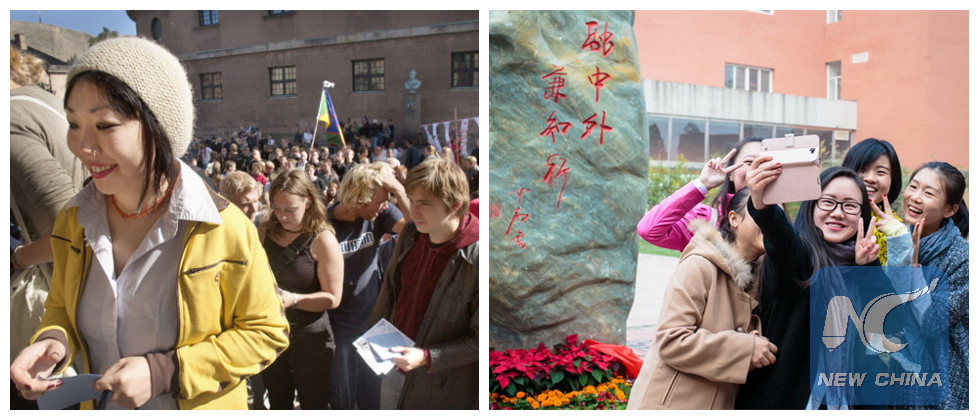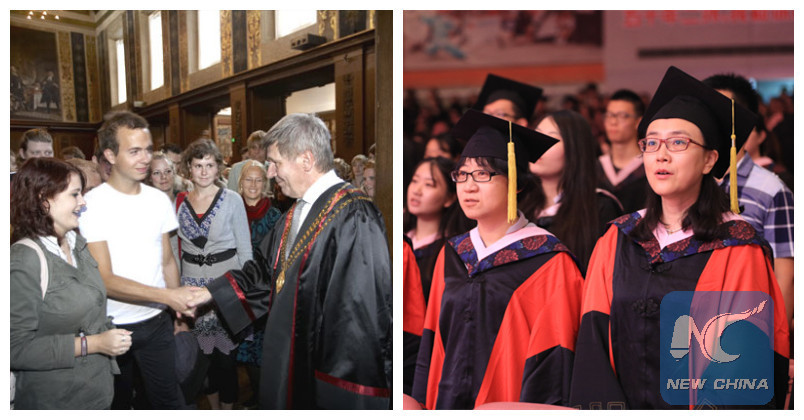By Ru Ge
As a Chinese exchange student who has been studying at Copenhagen University (UCPH) for nearly five months, I have experienced major differences between Danish college lifestyles and what is common among Chinese students. In the process, I have gone through the full gamut of feelings about what I learned, ranging from unfamiliarity and surprise to acceptance and adaptation.

UCPH/BISU photo
Recently, Denmark and China have entered into a range of collaborative agreements in areas including research, innovation and higher education in order to enhance knowledge transfer between the two countries (My Danish Education: Stories From Five Successful Chinese Graduates, p14). Against this backdrop, more Chinese higher institutions are cooperating with their Danish counterparts and increasing numbers of exchange programs are being set up.
As a result of this, about 40 junior students majoring in English, interpretation and translation, journalism, and Chinese Literature from my school - Beijing International Studies University (BISU) - will study cross-cultural studies at Copenhagen University next year. Similarly, about 40 Danish students majoring in Chinese studies will come to my university to learn Chinese history, literature, and language.
The numbers of exchange students will double, year-on-year, going forward. Because of the upcoming collaboration between my university and Copenhagen University, I think it will be enlightening and helpful to look into the differences in terms of lifestyles between Chinese and Danish university students, especially for those Chinese students who are going to study in Denmark for one or two semesters next year. I believe that after reading this article, they will become familiar with Danish culture to some degree and will at least have some emotional preparation for the exchange program.
Since basic college life is composed of four parts (studying, working, entertainment and living), my particular focus will be on a comparative study between Danish students and Chinese students on these four areas of students' lives. The main research method of my project will be a combination of conducting field trips (like classroom participation, interviewing Danish students and international students who have lived in Denmark for a while, and going to the places where Danish students usually prefer to socialize, such as bars on Friday) and extensive research drawing on both printed materials and authoritative information available online.
Study:
When talking about their university studies, what Danish students are most proud of is that they don't have to pay any tuition to for college education. In addition to that, their education is heavily subsidized by the government through grants paid to every student of 5,900 kroner (some 890 US dollars) per month regardless of financial need (Rydahl, 2017, p33). These huge subsidies ensure that students can maintain a relatively decent life without worrying too much about their subsistence and can devote themselves to studies.

UCPH/BISU photo
Concerning the issue of freedom offered at the university, I really envy Danish students. In Denmark, it seems that each student has ample freedom to choose his or her own direction in the educational process, and within certain limits, they can personally influence the contents and methods used along his or her chosen route of study. A few of my Danish friends studying in Copenhagen University told me that changing their own major is really easy. If one studies in a certain academic field for some time and find out it doesn't interest them any more, or they don't think it will be helpful for their future career, they can change their major at any time. Thanks to the freedom of choosing or adjusting the field of studies, many students are really passionate about the academic area they are pursing.
One of my friends, who originally majored in political science, changed to Japanese after two years of study. Although he cannot not receive a degree in political science any more, he says he really enjoys his work. As of now, he has only enrolled in the Japanese studies program for half a year, but he can already speak fairly fluent Japanese.
In addition, perfect attendance is not compulsory. Sometimes, nonattendance is even encouraged especially if some students have more important work to do. So some students often skip a few classes and participate in voluntary work or undertake an internship which might further their careers in the future. Some others just prefer studying by themselves and they think they can study more efficiently compared to listening to a lecture offered by their tutors. All of these reasons are acceptable and in the opinions of some teachers it shows that students are thinking independently and making decisions wisely, allowing them to be more goal-oriented upon their return.
In the Danish educational system, group evaluation of an assignment is very common. It's a uniquely Danish phenomenon. The concept was introduced in 1993 by the socialist government at the time, with the aim of cultivating group cohesion and team spirit (Berlingske, January 8, 2007). It usually takes the form of a combination of a written project and an oral presentation. Everyone in the group contributes to the written project and on the day of oral examination, each person presents their part individually. Each person is graded separately but one's grade is strongly influenced by the group' s performance.
I've observed my Danish friends majoring in Chinese studies preparing for a group examination. Approximately seven or eight students usually sit together on a couch or in a classroom specially designed for a group work and discuss the topic they are going to present in the class. When they stop discussing, they usually take out their laptop and search for some relevant materials and information on the Internet and try to note down the details that are relevant to the discussion. Some of them will try to review the chapters of textbooks they've studies and sort out their train of thought and ideas presented on the textbook, until they can use their own words to present the general ideas. As far as I can see, this kind of "group work study and evaluation mode" is a very helpful and advanced way of doing things.
There are many benefits behind it. For example, students not only gain theoretical knowledge through the research and evaluation process but also know how to collaborate with their peers and learn from each other. In addition, students must also know how to think critically and analytically, because the success of the assignment is not mainly dependent on whether one can remember the theoretical knowledge by heart, but more on whether one can apply their knowledge practically and offer evidence that they have understood concepts on a critical and logical basis. Evidence shows that these benefits have a positive long term effect on students' career adaptability.
Mr. Mingdong Dong, a successful Chinese graduate who gained a Ph.D. degree in nanotechnology from the Department of Physics and Astronomy, University of Aarhus, is currently working as a Research Associate at the prestigious Rowland Institute at Harvard University in USA. He still collaborates with his former colleagues from Denmark on several research projects, and he still meets with his supervisor and colleagues through Skype for discussions about incomplete and upcoming projects (My Danish Education: Stories From Five Successful Chinese Graduates, p4). The skills and experiences he gained from the unique environment provided by the group work really helped him in the course of carrying out his current research.
Concerning the matter of classroom attendance, Chinese universities are stricter with students. Although it varies depending on the course, generally, when a student's number of missed classes reaches a certain number, they are not allowed to sit the examination. This means the students fail the course and there will be a very bad mark left on their performance report. Usually ambitious students cannot accept the bad score, especially if they want to further their studies in the future. Students need high GPA so that they can apply for a good graduate school, so the heat is always on and students are pressured to make high marks.

UCPH/BISU photo
In China, the most common way of evaluating a students' academic performance is to offer a written examination. Students have to finish it within a certain period of time in the classroom where there are one or two supervisors making sure no one is cheating. When time is out, everyone has to hand in their examination paper (which usually takes the form of multiple choice questions, short answer questions, filling in the blank, and reading comprehension). Sometimes, there are oral examinations and presentation tests as well, but usually they don't account for a huge percentage of the total grade given, so they are not the most important parts.
I would argue that the Chinese way of evaluating students' academic performance is much stricter compared to the Danish way, because there is usually only one right answer to each question. So students have to work very hard in terms of rote memorization of theoretical knowledge in order to give a perfectly correct answer on their examination paper. Some might argue that it's very harsh to ask students to remember so much theoretical knowledge by heart, and that it puts too much pressure on students. But this way of examination has its own advantages. Chinese students are famous for having a really solid academic foundation in international competition because Chinese schools put a lot of emphasis on the ability of students to acquire basic knowledge. To take an example, in the OECD PISA 2010 survey, students in Hong Kong and Shanghai had the highest results of all the OECD countries assessed, which really proves that the Chinese way of inculcation and evaluation of students has its strengths. But I would suggest that each system can learn from the strengths of the other: there are ways the Chinese system could be more flexible, just as there are ways that the Danish system could do more to ensure that students are acquiring basic, general education-type knowledge on an easily-evaluated and measurable basis.
Work:
In Denmark, more than 80% of students who are over 17 years old have a job outside of school (Rydahl, 2017, p41). Usually, female students make extra money doing things like babysitting, cleaning and working as sales assistants in bakeries and newsstands. But male students prefer doing newspaper rounds and sorting bottles for supermarkets. But there are other options that are much less mainstream.
One of my Danish friends, a student majoring in Chinese studies chose a different path. He is passionate about collecting bikes from a recycling center near his home and rebuilding and repainting them. After some mechanical and artistic restoration, the old bikes are given a new, refreshed look. Then he sells them as a way of earning some extra money. Currently he is rebuilding the sixth bike that he saved from the dump. It is really remarkable that he can turn this hobby into a way of making some extra cash during his university studies.
Another friend of mine is a straight A student who is majoring in art history. He has two part time jobs. One is teaching English and history to a third grader, which is (to a certain degree) related to his field of studies. The other is being a judo player and judge during International competitions, which is his life' s passion. He has practiced judo since childhood, and has won international judo competitions many times. So doing this part job is a most enjoyable experience for him.
It appears that many Danish students are able to enrich their lives considerably during university: turning outside hobbies into ways of earning extra spending money while also gaining valuable work experience.
The primary reason that Danish college students like to spend a few weekdays or part of their weekends doing part-time jobs, to put it more simply, is that they long for independence and autonomy. They want to pay for their activities themselves and they don't want to keep asking for money from their parents.
In China, according to a survey conducted by Sohu.com, only 52.5% of college students in China have done part time jobs during their studies. And on average, their working time is only 0-4 hours per week. This is really different from the case in Denmark, where most college students have part time jobs and their working hours outside the classroom are relatively longer.
In my opinion, there are two main factors that contribute to this phenomenon in China.
First of all, the academic pressure is really heavy in Chinese universities. Students have to work very hard if they want to have solid academic performance, which is considered to be the most important thing in a Chinese school.

UCPH/BISU photo
Those with better academic performance will accordingly have more opportunities and benefits. Those opportunities and benefits include the chance to be an exchange student abroad (For example, there are only eight students in my major that have the chance to be an exchange student in Denmark for a semester, but there are almost 220 students competing for the opportunity, so the competition is really fierce), internship programs in an embassy, scholarships, and so on. Because of these potential opportunities and benefits, and also because of the pressure imposed by schools and parents, students really put a lot of effort into their academics and don't have much time left for part time jobs.
In China, the connection between children and parents is much closer in comparison to western countries. In the mindset of many Chinese parents, it's their obligation to take care of their children until they finish their studies. Because most Chinese college students are financially supported by their parents and are offered monthly living costs, they don't have much in the way of a financial incentive to take up part-time work.
Within the 52.5% of Chinese college students who have experience doing part time jobs, 32.53% say that they do so in order to enrich their qualifications so that in the future when they graduate, they are more likely to be employed due to their prior work experience. 17.66% said that they just followed the crowd. When their friends are interested in a certain occupations and want to give it a try, they often to do the same thing so that they can keep the same pace with their friends. Only 12.08% of college students did part time jobs due to the reason that their family was very poor and they could not support themselves. So it is clear that for most Chinese students who do take up part time work, their reasons for doing so are not financial in nature.
Entertainment:
In Denmark, the main place that youth go to be entertained is the local bar.
For Danish college students, this holds true as well. They enjoy singing, dancing, and drinking every Friday night in bars. It's a place where many college students spend their late Friday when they finish all their work and studies and have their minds set on having a hyggeligt (a Danish word that means a cozy and comfortable time).
What I've witnessed during my studies at Copenhagen University is that "Friday bars" are all over the campus. It seems that almost every faculty has their own Friday bar and they are run and profited by students. On any given Friday evening, students gather at their own faculty's Friday bar and start to order their drinks. Beers, ginger tonic, shots, liqueurs, cocktails and all kinds of other drinks that I cannot name are sold. Most students I' ve seen have a great capacity to drink alcohol. One guy from the religious studies program proudly told me that he starts to get drunk when he drinks seven bottles of beer, but he is far from being smashed until he reaches 15 bottles. Drinking with friends is a social lubricant for Danish students.

UCPH/BISU photo
According to a cross-national study concerning the alcohol consumption of 15-year-olds in Denmark, especially their experience with drunkenness, is the highest in Europe (Bendtsen, 2013; Currie et al., 2012).
Smoking, although it's a very unhealthy lifestyle choice, is also common among Danish college students. One Danish girl who is majoring in English at Copenhagen University told me that she thinks alcohol and tobacco is the perfect combination and that they mix well together. Another Danish boy majoring in Chinese studies told me that 10 out of 20 students in his class smoke as a way of relaxing. Through the glass wall of a teaching building in Copenhagen University, I can see a bunch of Danish students having a lot of fun outside in the balcony smoking, drinking and chitchatting. I took part in conversation once but ended up inhaling a lot of second-hand smoke, and it was not a very pleasant experience for me because after that Friday, it felt like something was stuck in my throat for two whole days. I guess it's the side effects of nicotine. After some cigarette ashes fell on my favorite item of clothing given to me by my mom, I decided that I would no longer take part in this particular aspect of university social life.
Another way of relaxing for Danish college students that is quite pervasive is also taboo in Chinese culture to a certain extent. I know Denmark was one of the first countries to legalize pornography and same-sex marriage and it's relatively tolerant concerning sexuality, but I didn't expect to see such openness about sexuality in a university setting. On a usual Friday night, in the huge party hall of Copenhagen University, I can see a lot of Danish college students who seemed to be total strangers start to kiss after only talking to each other for five minutes.

BISU photo
Unlike the relatively monotonous Danish university bar culture and related recreational activities, Chinese college students' leisure time activities seem more diverse and less centered around drinking.
One common way of relaxing is going shopping. During the weekends, many Chinese students prefer going shopping in the prosperous shopping districts, especially if they study in a first-tier city in China. There are all kinds of clothing stores from all over the world. I don't mean to say that there aren't any big shopping districts in Denmark, but compared to China, their working time is relatively shorter. They usually close at 5 or 6 in the evening due to the high manpower costs. But in China, shopping centers close at 10 or even later, so enjoying shopping all day is more possible.
Eating out is a common way for college students in China to relax. There are delicious and cheap street food stands in many places selling small steamed buns, crispy sugar-coated haws, baked lamb shashlik with cumin spread on it, spicy hot pot, and other options. In restaurants, there are dishes from all over the world: Japanese sushi, Korean barbecue, Italian food, Danish rye bread and open face sandwiches... In short, China is a paradise for foodies. Delicious food is everywhere and most of it is sold at an affordable price.
For this reason, it's common for college students dine at fancy restaurants and try some delicious food with their friends during their spare time, and there is no need to worry about the price of the dishes. Good food is plentiful and cheap.
Singing in a karaoke box is becoming increasingly popular among college students in China. When they feel pressured, and want to let off steam, they will invite a few of their friends and rent a room in what is known as a KTV. After singing freely in the box for a few hours, usually they will feel more relaxed.
Movie theaters are set up in almost every huge shopping center. With the improvement of technology, 3D or 4D movies are becoming very common. Chinese college students are patronizing these sorts of movie theaters more and more.
These are just a few of the more intriguing leisure activities Chinese college students would like to do. Because there are so many choices, it's impossible to include all of them in this research paper.

BISU photo
Accommodation:
In Denmark, the average yearly stipend was 45,023 kroner for students not living with their parents in 2008. Students who are still living at home received less, or a sum equal to the amount a student under 20 years of age received (Hastrup, 2011, p155). As a result of this, college students prefer living on their own so that they can receive more support from the Danish government compared to living at their parents' place. In addition, they will have more independence and more control over their lives. This state of life is longed for by Danish children from the time when they are very young and it's one of the fundamental underpinnings of Danish happiness.
When students start their college life, there are a few choices of accommodation in addition to living with their parents. One of the more popular choices is living in a Kollegium/Kollegiet (a kind of student dormitory), which is different from the concept of a university dormitory formed in Chinese mindset. This kind of dormitory doesn't have to be constructed on the university campus and doesn't have to belong to a certain university. College students live in Kollegium have their own private room but usually they will share kitchens, bathrooms and activity rooms with other students. They will meet a lot of students from all over the world and it's likely for them to form deep friendships because they have a lot of time to get along with each other and participate in activities such as cooking, drinking, watching football games and partying together.
Often, international college students enjoy living with a Danish family during their exchange period. It's more like a home stay than a dormitory experience. For those international students, it's a great opportunity for them to experience Danish lifestyles and familiarize themselves with Danish culture. Although the living costs are usually higher than living in a student dormitory, students usually will have a sense of belonging, even though they are far way from their real home. Their Danish hosts might often treat them as a family member, doing things for them like cooking delicious Danish homemade dishes for them.
Another way of securing a home for college students is renting a small apartment with close friends of significant others. Usually it's not cheap to live in the downtown areas of Copenhagen, students who study in Copenhagen would prefer renting an apartment in the suburban area of Copenhagen or other cities close to Copenhagen since the public transportation is very convenient in Denmark, with things like the s-train, metro and bus lines quite dense and covering many areas.

BISU photo
In China, most college students live in the college dormitory. It's usually located within the university and the conditions are rather simple and crude. In my home university, five girls share a room which is only approximately 20 square meters large. There are two double-decker beds in the room and one single deck bed with three desks under it. The other two desks are connected to the wall on one side of the room. There are two iron-made cupboards and each of them is divided into five parts, which means each student has two parts to use. There is a long clothes rack attached to the roof of the dormitory, so that after washing clothes, students can hang their wet clothes on it. For boys, they live in another building in the university, and six of them share a room. I've never been inside of their dormitories before, because most of the time it's not allowed for girls to go in, but I assume the conditions are similar.
This is the case in most universities in China, although the conditions are not that good but we are satisfied because we don't have to pay much for accommodation (only approximately 700-1,200 yuan for a year) and it's really convenient to get to the teaching building because dormitories are situated on campus.
Summary:
The comparative look I have taken between Danish and Chinese college students lifestyles demonstrates that the difference is huge between two countries concerning these four areas of college life.
It can be generally stated that Danish students' study life is more relaxed and students have many more choices and can really follow the path they are passionate about. Chinese students' study lives are more laborious and painstaking, but their academic foundation is relatively solid as a result of this rigor.
Concerning working life, Danish students mainly depend on work to make a living and support themselves. Some might also take it as a hobby, others just as a means to make money. But in general, they work outside the classroom more often than Chinese students. For Chinese students, because of heavy academic pressure imposed on them, along with a societal mindset that places paramount importance on academics, the tradition is for parents to support their children financially before they graduate, so Chinese students don't work very outside the classroom compared to their Danish counterparts.

BISU photo
Danish college students prefer going to a bar and doing things related to bar culture. For Chinese students, their choices are more varied and diverse, and less centered around alcohol.
And in terms of accommodation, Danish college students mostly tend to dwell in a Kollegium/Kollegiet. Relatively few might live in their parents' place, shared apartments or in other Danes' homes. For Chinese students, they mostly live in school dormitories on weekdays and go back to their parents' home during weekends if it's possible for them.
In conclusion, I believe that the differences outlined here can be both helpful and informative for potential Chinese exchange students planning to study in Denmark. By keeping these differences in mind, students from China can know what to expect and be proactive in making choices during the course of their studies.

UCPH photo

